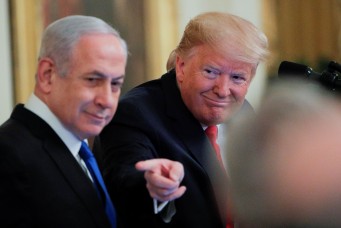Opportunity of the Century?
Jared Kushner’s economic stimulus initiative to solve the Palestinian issue was introduced in the 80s and ended in failure.

White House senior adviser Jared Kushner, and Saudi Arabia’s Minister of State for Foreign Affairs Adel al-Jubeir are seen as United States President Donald Trump holds a working breakfast meeting with Saudi Arabia’s Crown Prince Mohammed bin Salman during the G20 leaders summit in Osaka, Japan, June 29, 2019. Courtesy of Saudi Royal Court/Bandar Algaloud
When presented with international initiatives, such as the American proposal to resolve the Palestinian–Israeli conflict and the economic incentives announced in Bahrain in late June, reactions should be governed by two paramount principles. Firstly, one must not immediately embrace seemingly attractive international initiatives. On the other hand, one must also not rush to reject new ideas. Learning and considering the details must come before determining positions. If successful, an American solution to the Palestinian–Israeli conflict would indeed become the “deal of the century”.
Many aspects of this American initiative could be welcomed: a comprehensive package rather than endless negotiations is commendable, while placing the deal within a regional framework is also not objectionable. This follows the same model adopted by the Arab Peace Initiative first introduced at the Arab Summit in Beirut in 2002.
Nevertheless, it is most probable that this initiative will be stillborn because it suffers from numerous fundamental flaws: the strident American bias toward Israel exemplified by the transfer of the American embassy to western Jerusalem, the closing of the U.S. consulate in eastern Jerusalem, the withdrawal of American support for the United Nations Relief and Works Agency for Palestine Refugees in the Near East (UNRWA), and the lack of enthusiasm among current administration officials for the two-state solution.
Jared Kushner, President Donald Trump’s son-in-law and political advisor, confirmed these biases in his latest discussion with the Washington Institute for Near East Policy. While suggesting that a comprehensive approach is a positive development, he avoided the issue of Palestinian statehood. When the Washington Institute’s director Robert Satloff pressed him about the reason behind his determination not to mention a Palestinian state, Kushner continued to avoid the use of the word “state,” saying it meant one thing to Israelis and another to Palestinians. This approach is, not surprisingly, alarming for Palestinians and Arabs alike.
In the interview, Kushner confirmed the priority status that Israeli security continues to enjoy in American thinking. He stated that the Palestinians do not have faith in their leaders and argued that it is better to focus on economic growth and improving living standards. In doing so, he disregarded that in peacemaking, providing economic incentives alone in the absence of a suitable political framework, is an outdated methodology that had failed ever since it was first introduced in the 1980s by former U.S. Secretary of State George Shultz. The idea was even later floated by Shimon Peres, Israel’s foreign minister during the 1990s, in the context of initiatives and Middle East summits focusing on regional economic cooperation, and yet another time more delicately by former U.S. Secretary of State John Kerry during the Barack Obama administration. All of these previous attempts failed because they were not coupled with energetic principled efforts which respected the inalienable rights of the Palestinians, despite the fact that America was committed then to a two-state solution and to resolving the Arab–Israeli conflict based on the June 4, 1967 borders.
Preceding the recent Bahrain Workshop held on June 25 and 26, Kushner rolled out a comprehensive plan on economic stimulus titled “Peace to Prosperity”. American analysts reacted swiftly to the plan—even before Arab reaction—calling it unrealistic and lacking new vision given that the philosophy of putting economics before politics is a proven failure. Moreover, they questioned whether extensive international funding will be available to the Palestinians in the absence of prospects for peace and stability. They also noted that the proposal also failed to address legislation—such as the 1961 Foreign Assistance Act (and its amendments), which bars the United States from participating in these specific types of aid initiatives for the Palestinians.
In that light, the conference in Bahrain was received negatively by the Palestinian Authority. For their part, a number of Arab states which participated in the summit reasserted their official and unified position regarding the need for a two-state solution, and for east Jerusalem to be the capital of the Palestinian state; they see these as prerequisites for peace in the Middle East. Furthermore, they argued that meeting the national aspirations of the Palestinian people and freeing them of oppression would prevent radicals from exploiting the conflict to promote extremism.
Nevertheless, Kushner described the “deal of the century” as “the opportunity of the century,” one that would open the door to more concrete solutions relevant to the demands of the Palestinian people; he did, however, acknowledge that economic prosperity cannot be achieved without peace.
For its part, the Israeli side will in the coming weeks propagate the narrative that the American initiative has opened the door to relations with other Arab states, especially in the Arabian Gulf. Israeli Prime Minister Benjamin Netanyahu will continue to bullhorn this message to serve him in the September 2019 Israeli legislative elections.
In fact, economic discussions between the Arabs and Israelis are hardly new developments. Multilateral negotiations arose out of the 1991 Madrid Peace Conference, which established an intergovernmental working group specifically on economic cooperation. What is actually new here is that we have an incomplete American initiative— details of which have yet to be fully divulged—and that the future of the Palestinians is being discussed in their absence.
It seems the Trump administration presumes that since the Arabs find themselves in turbulent political waters, this will force them to renounce support for the Palestinian issue, particularly as they court an unconventional, materialistic American leadership whose support they need to face complex threats and dangers to the region.
This analysis is false. The creation of an independent Palestinian state is widely supported in the Arab World and a one-state solution represents a direct threat to Jordan. In addition, Arab and Muslim states will not accept any proposed solution where the Dome of the Rock will continue to be administered by Israel.
Some wonder why Arabs are reluctant to seize the “opportunity of the century” given that the plan could be better than nothing. The answer, simply put, is the fear that the “opportunity of the century” is actually part of the unfathomable “deal of the century,” whereby the United States attempts to convince Palestinians to forgo their national rights in exchange for economic aid, which would be shouldered mostly by wealthy states globally, and Arab states.
Measures taken recently by the Trump administration further exacerbate and heighten these Arab concerns, because they impact the final settlement of the Palestinian–Israeli conflict, especially as it relates to the creation of a Palestinian state, the status of Jerusalem, and the right of return.
If the United States is truly operating in good faith and wants to achieve a deal that commensurately responds to the rights of all, it should unequivocally announce that the end of the Arab–Israeli conflict must be based upon the Arab Peace Initiative, which calls for the end of Israeli occupation based on the 1967 borders, and the creation of a Palestinian state that includes East Jerusalem within those borders. The statement should include a solution to the problem of Palestinian refugees with the establishment of normal relations between Israel and the Arab World leading to peace. On that basis, the United States should also call for intensive negotiations between the Palestinians and the Israelis to finalize the details toward achieving a two-state solution.
I will continue to await more details on “the deal of the century” before making a final determination albeit with increasingly little optimism. With the 2020 American presidential election campaign coming up, President Trump will avoid even the semblance of putting pressure on Israel as he caters to the right-wing, American Jewish communities and his evangelical supporters who pushed for the relocation of the American embassy from Tel Aviv to occupied Jerusalem even before the announcement of the so-called “deal of the century”.



